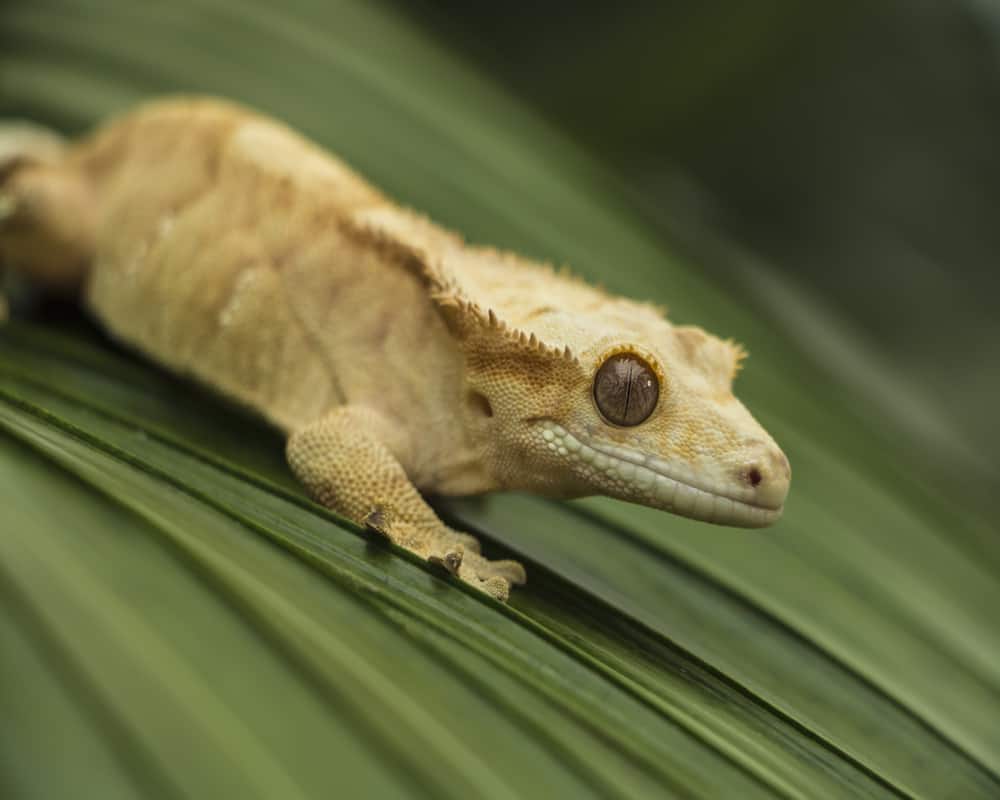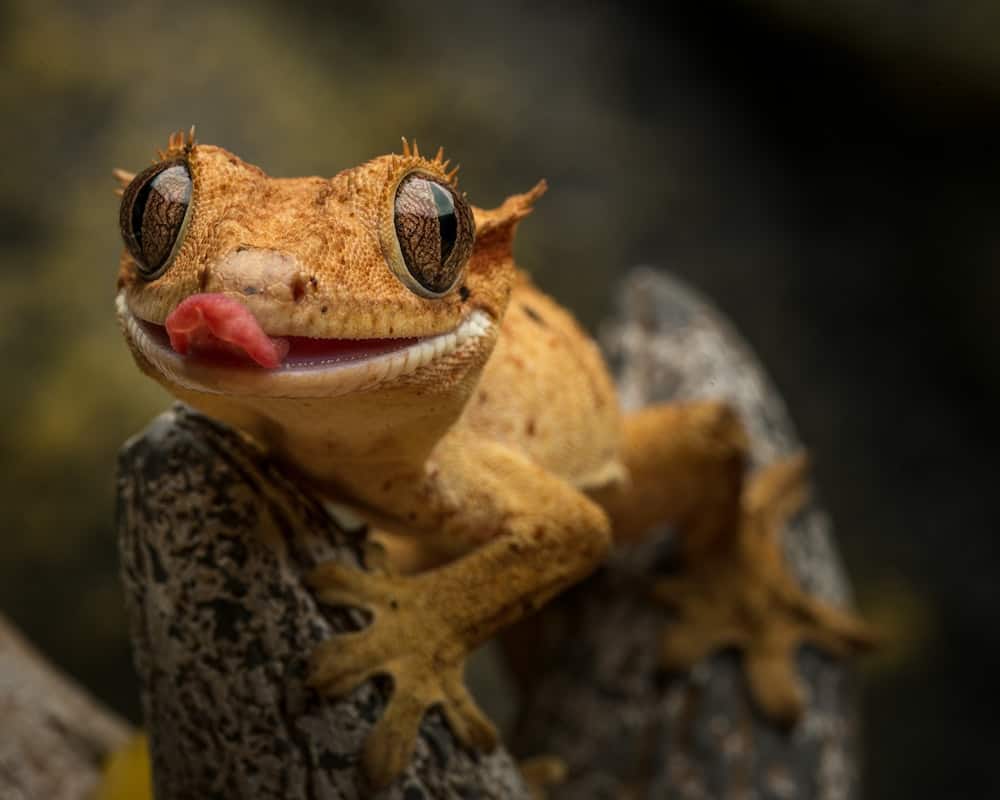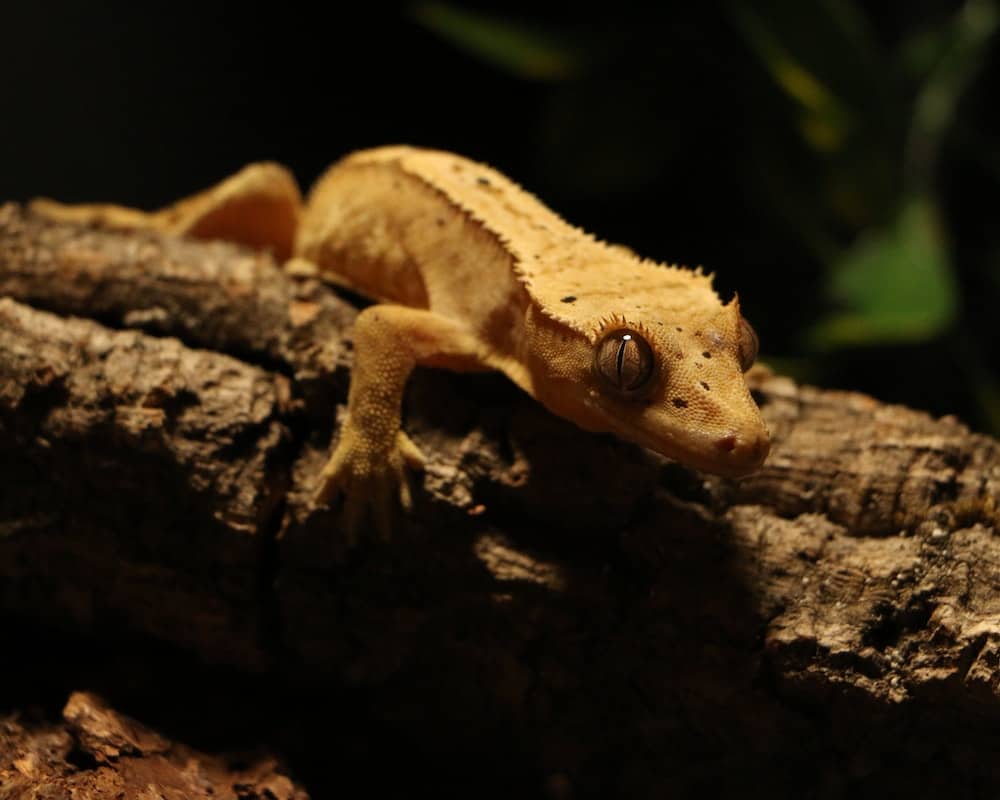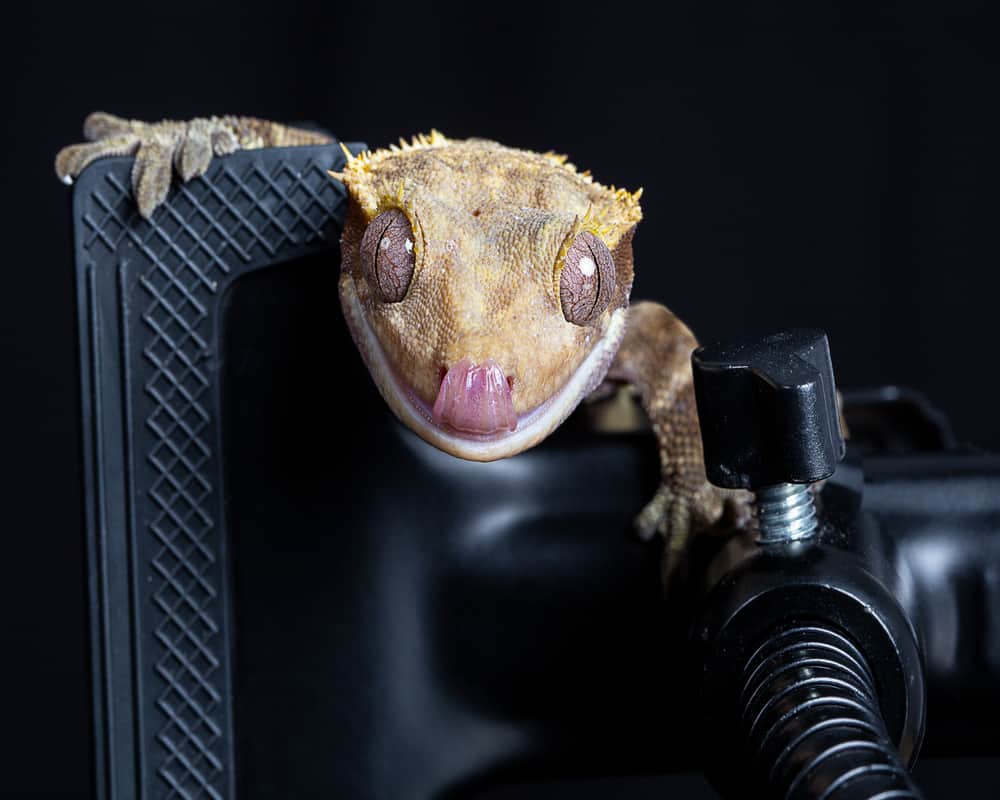Have you been observing your crested gecko, which looks dull and sluggish? Are you perhaps wondering whether it is dehydrated? What are the symptoms that could mean that your gecko is dehydrated?
A crested gecko is dehydrated if it shows the following symptoms: lack of elasticity in the skin, lack of appetite, lethargy, sunken eyes, ribs, and hips sticking out, sticky tongue, constipation, and incomplete shedding.
6 Major Dehydrated Crested Gecko Symptoms
Following are some of the symptoms that indicate that your pet crested gecko is dehydrated:
- Loose Skin
The most visible symptom of dehydration with your pet is loose skin devoid of elasticity. An inelastic skin means the water intake of your crested gecko is poor.
You can test this yourself. Gently pinch your crested gecko (do not pinch it hard, as it can hurt it). If the skin returns to its original state immediately, your pet is hydrated. However, if it takes longer, then your crested gecko is dehydrated.
Along with the loss of elasticity, your crested gecko’s skin can also appear dry and flaky.
- Lack of Appetite
If your pet crested gecko isn’t eating its food, it probably is dehydrated. A lack of appetite can also accompany a loss of weight. So any weight loss along with lack of appetite should be monitored for signs of dehydration.
It is crucial not to force your crested gecko to eat if it is dehydrated. Focus on rehydrating your pet.
Once hydrated again, its appetite will improve.
- Lethargy
Another clear sign which indicates dehydration is lethargy and general sluggishness. Your pet crested gecko may not be interested in its usual activities and might appear dull and sluggish.
Lethargy could also be a symptom of some illness, bacterial infection, or even overexposure to heat in the pet enclosure.
To conclude, whether your pet crested gecko is dehydrated, it is always best to look out for other symptoms of dehydration.
Crested geckos can also be lazy during brumation but can still be dehydrated.
- Other Physical Symptoms
One physical sign that your pet crested gecko is dehydrated is if its eyes appear sunken and deeper in the eye sockets.
Lack of water can also make your crested gecko look bony. More prominently, its ribs and hip bones might protrude. However, this particular symptom applies only to adult crested geckos, not baby crested geckos.
You can also look out for a sticky tongue and a dry mouth. A sticky tongue will make it hard for your pet to eat its food, causing weight loss too.
- Constipation
Water is vital for performing all bodily functions smoothly. This includes bowel movements. If your crested gecko has trouble with its bowel movements, it could mean it is dehydrated.
- Trouble Shedding Skin
Lastly, if your crested gecko is dehydrated, it might have trouble shedding its skin. You can notice incompletely shed skin or some parts of the shed skin stuck on your crested gecko’s body.
What Causes Dehydration in Crested Geckos?
Following are some essential reasons why your crested gecko can get dehydrated:
- Less Water Intake
Crested Geckos are an arboreal species belonging to the reptilia class, native to tropical regions. Since reptiles are cold-blooded, they will regulate their body temperature as per external sources or the environment.
In case of lack of heat, all reptiles, including crested geckos, become hypothermic, i.e., their body temperature declines. When reptiles are in hypothermia, they often tend to get dehydrated.
Also, in wild habitats, crested geckos usually stay hydrated by drinking water droplets from the leaves of trees. Therefore, In a domesticated environment, crested geckos will not naturally drink from only the water dish leading to dehydration.
- Excessive Exposure to Heat in the Terrarium
Too much exposure to UV light and heat in the pet enclosure can result in dehydration in your pet crested gecko.
Increased amounts of heat can also lead to rapid loss of water. Ensure the pet enclosure temperature does not go beyond 78-80 degrees Fahrenheit.
- Low Humidity Levels in Pet Enclosures
Crested geckos are native to humid environments. If the humidity levels in your terrarium dip lower than 60%, your crested gecko may suffer and get dehydrated.
- Consumption of Only Dry Food
Offering only dry pellets to your crested gecko could also be one reason why your pet might be dehydrated.
The dry pellets lack moisture and therefore are not a good source of natural hydration, leading to symptoms like constipation and dry skin.
- Illness
In some cases, your crested gecko may not be drinking actively or could be lethargic due to some other illness or infection it might have. In this case, look for other symptoms indicating any sickness.
Make sure you immediately consult a veterinary doctor.
How Can You Rehydrate Your Crested Gecko?
If your crested gecko is not severely hydrated, you can try rehydrating your crested gecko at home. However, taking your crested gecko to a veterinarian if it is severely dehydrated is essential.
- You can start by misting the environment so that your gecko laps up water from the droplets formed on the inner walls of the terrarium.
- You may also try giving it a gentle bath. Crested geckos absorb water through their skins, so a bath can benefit your crested when extremely dehydrated.
- However, please do not give it frequent baths or soak it in water often, as it can stress it out. For a more regular hydration routine, please give it a sauna.
- Also, provide some food with water, like certain fruits and mealworms. This will increase the water they consume naturally and hydrate them.
Extreme dehydration can sometimes be lethal to your crested gecko, so severe symptoms of dehydration need immediate attention from a veterinarian doctor who treats exotic animals like crested geckos.
A veterinary doctor will know how to administer IV fluids to your pet and suggest proper treatment.
If you are unsure if your gecko is mildly or severely hydrated, do not guess. Immediately consult a veterinary doctor.
What Can You Do to Prevent Dehydration in Your Crested Gecko?
Prevention is always better than cure, so you can take specific measures to prevent your crested gecko from getting dehydrated in the first place.
- Ensure Appropriate Heat Levels
Always ensure the temperature inside the pet enclosure is between 72 – 78 degrees Fahrenheit (22 – 26 degrees Celsius).
Investing in a thermometer to monitor the temperature inside the pet enclosure will go a long way.
- Provide Food With Water Content
Ensure you provide a rich and varied diet to your pet crested gecko.
You can offer your pet fresh, safe fruits like bananas, figs, strawberries, blueberries, apricots, mangos, dates, plums, peaches, and grapes. Avoid citrus fruits, as they are unsafe for your crested gecko.
Along with fresh fruits, you should also add a variety of mealworms and gut-loaded insects to your crested gecko’s diet.
You can always spray the food with water before giving it to your pet to increase the intake of water content.
- Regular Misting of the Pet Enclosure
Crested geckos will mostly stay hydrated by licking the water droplets from the inner walls of the pet enclosure. They are less likely to drink water directly from the water dish.
Make it a routine to mist your crested gecko’s terrarium. The water trickling down the inner walls will be perceived as running water and is more likely to be consumed by your pet.
- Avoid Overexposure to UV Light
UV light is an essential component for keeping your crested gecko healthy. However, overexposure to UV light can dehydrate your crested gecko.
Ensure you provide plenty of hiding spots in the pet enclosure while setting up the terrarium. These hiding spots will ensure that your gecko is not always exposed to UV light.
Also, investing in a UV light that does not emit heat will help maintain the heat levels of the terrarium.
- Ensure Correct Humidity Levels
Lastly, maintain appropriate humidity levels in the pet enclosure. A dry habitat is an invitation for dehydration for crested geckos.
Monitor the humidity level by using a digital hygrometer. The ideal humidity levels are somewhere between 50-70 percent.
Misting the pet enclosure using a water-spray bottle will help you maintain the proper humidity levels.
Conclusion
The dehydration of your crested gecko is not to be overlooked. It is a symptom that needs your attention, as dehydration can be fatal if ignored. In case of severe dehydration, consult a vet.




